Mental Fitness Cards that Really Work
 Couple of years ago I bought a pack of Mental Fitness Cards and started to experiment with them. You get 100 cards that provide very specific activities designed to maintain or even enhance the senses, memory, problem solving, linguistic abilities and numeracy. The cards come in a nice sturdy box and include a booklet that provides an overview and suggestions for how to use the cards.
Couple of years ago I bought a pack of Mental Fitness Cards and started to experiment with them. You get 100 cards that provide very specific activities designed to maintain or even enhance the senses, memory, problem solving, linguistic abilities and numeracy. The cards come in a nice sturdy box and include a booklet that provides an overview and suggestions for how to use the cards.
The cards are geared for seniors but I have found 12 that appear to be very useful in general.
One of my favorites is #91 Sharpen Your Hearing. The activity involves turning the volume down on your TV or talk radio show until you can hear but no longer make out what is being said. You then slowly turn it up until you can just barely but clearly hear what is being said. When you repeat this you should not have to turn it up as much to get words because you are learning to focus your hearing. The card talks about drawing lines a on sheet of paper to measure progress. I did not track with that but do it in the car where my radio gives me a number for the volume setting. This way I can measure progress exactly. I am not recommending that you do this in the car.
I am interested to hear from readers about other card-based mental fitness products and how they are using them.
Categories: Books, Cognitive Decline, Memory and Learning, Older Adult, Perception Tags:
Develop Your MOT – Multiple Object Tracking Skills
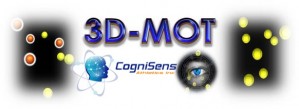 CogniSens Athletics is a small company dedicated to translating the latest neurophysics into tools for improving the cognitive performance of athletes. They just announced the release of 3D-MOT a three dimensional (3D) immersive training environment for developing the cognitive skills needed for multiple object tracking (MOT). It uses a computer and specialized goggles to teach you how to visually track more than one moving object at a time. A key cognitive skill in sports. To quote a news release:
CogniSens Athletics is a small company dedicated to translating the latest neurophysics into tools for improving the cognitive performance of athletes. They just announced the release of 3D-MOT a three dimensional (3D) immersive training environment for developing the cognitive skills needed for multiple object tracking (MOT). It uses a computer and specialized goggles to teach you how to visually track more than one moving object at a time. A key cognitive skill in sports. To quote a news release:
“D-MOT is a scientifically designed system for improving perceptual tracking skills by expanding an athlete’s capacity to absorb and process complex movement information. … players have shown that just one hour of distributed 3D-MOT stimulation yielded an average of over 50% increase in capacity to track at speed, with greater increases being realized with extended training. ”
 Most of us won’t have the opportunity to use such technology but I wonder if there is not more generally available options that produce some of the same effects. My guess is that some video games are an example.
Most of us won’t have the opportunity to use such technology but I wonder if there is not more generally available options that produce some of the same effects. My guess is that some video games are an example.
Consider Geometry Wars. Definitely need to be able to track multiple moving objects at once to get anywhere with this game. Indeed, in playing it, I have had to learn to defocus my eyes to increase my score. Most likely a sign that I am learning a new perceptual skill.
I am interested to hear from readers about examples of video games or other methods that can help us develop MOT (multiple object tracking) skills.
Categories: Mental Focus, Perception, Software, Training Tags: cognitive fitness, games, processing speed, sports
Brain Healthy Recipe of the Week Program
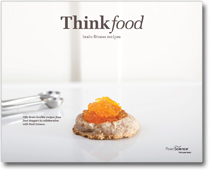 Posit Science, a brain training firm, recently announced a brain healthy cookbook and recipe of the week program called ThinkFood. You can signup here.
Posit Science, a brain training firm, recently announced a brain healthy cookbook and recipe of the week program called ThinkFood. You can signup here.
The first recipe is for Banana Oatmeal Chocolate Chip Cookies. You get a list of ingredients, preparation instructions, an explanation of why it is brain healthy and an introduction to the food blogger that authored it.
Just in case you are wondering, the Banana Oatmeal Chocolate Chip cookies are brain healthy because “They benefit from a combination of brain foods: chocolate, banana, flax, and walnuts. The more brain-healthy ingredients, the better!”
There are 50 recipes to try. Interested to hear from readers than sign up and put some of these recipes to the test.
Categories: Diet Tags:
Handful of Pecans a Day for Brain Health?
 Making small lifestyle changes can improve brain function and cognitive performance. Often small changes are easy to do and if you make enough of them they should add up and have significant impact. We have documented a number of such changes on the Next Brain Blog but I am always on the lookout for new scientific studies that might suggest more.
Making small lifestyle changes can improve brain function and cognitive performance. Often small changes are easy to do and if you make enough of them they should add up and have significant impact. We have documented a number of such changes on the Next Brain Blog but I am always on the lookout for new scientific studies that might suggest more.
Take for example a recent study in the journal, Current Topics in Nutraceutical Research, reported on here.
“The study, conducted at the Center for Cellular Neurobiology at the University of Massachusetts Lowell, suggests adding pecans to your diet may delay the progression of age-related motor neuron degeneration.”
The work is being done by the vitamin E (antioxidant) in the nuts. Please keep in mind this is a preliminary study done with mice not people. Fortunately, it turns out the pecans are otherwise good for you with many vitamins and minerals and no cholesterol or sodium.
I am interested to hear from readers on other small-step lifestyle changes they have made to improve brain function or cognitive performance.
Categories: Cognitive Decline, Lifestyle Tags: vitamins
Spas and Storefront Gyms for Your Mind
 The Next Brain blog frequently covers software and services that provide online gym-like training for improving brain function and cognitive performance. But there are a growing number of physical locations opening that offer spa and gym experiences for those interested in cognitive training. For example, there is the Mind Spa in Sarasota Florida offering everything from neurotherapy to brain games and sensory immersion.
The Next Brain blog frequently covers software and services that provide online gym-like training for improving brain function and cognitive performance. But there are a growing number of physical locations opening that offer spa and gym experiences for those interested in cognitive training. For example, there is the Mind Spa in Sarasota Florida offering everything from neurotherapy to brain games and sensory immersion.
 Or there is vibrantBrains in San Francisco that bills itself as a health club for your brain. They offer a checkup and a variety of circuit training programs using some of the best brain training technology on the market. For a more info on vibrantBrains check out this blog post.
Or there is vibrantBrains in San Francisco that bills itself as a health club for your brain. They offer a checkup and a variety of circuit training programs using some of the best brain training technology on the market. For a more info on vibrantBrains check out this blog post.
Interested to hear from readers that know about other storefront brain gyms or spas. What is the experience is really like?
Categories: Software, Training Tags: brain fitness, brain gym, brain training, cognitive fitness
Improve Mental Performance with Lucky Charms
Research just reported in Psychological Science, Keep Your Fingers Crossed: How Superstitions Improve Performance, provides strong evidence that believing in lucky charms might not be so irrational. Indeed, they may be important for improving performance.
“Specifically, Experiments 1 through 4 show that activating good-luck-related superstitions via a common saying or action (e.g., “break a leg,” keeping one’s fingers crossed) or a lucky charm improves subsequent performance in golfing, motor dexterity, memory, and anagram games.”
Good luck superstitions don’t require magic or any supernatural forces to work. They work by boosting your confidence or belief that things will go your way. Your lucky quarter, shirt, number, and all of that can in fact enhance your brain function and cognitive performance. This in turn can improve your outcomes but only when the outcomes depend upon confidence. So this effect will not work for picking lottery tickets.
Interested to hear from readers about the lucky charms they use to get through intellectually or cognitive challenging situations.
Categories: Lifestyle, Memory and Learning, Mental Focus Tags: Mindset
Mozart Effect Does Not Improve Spatial Ability
 There is no doubt music has a big impact on how we think and feel. But can it be used to improve brain function and cognitive performance? We have explored this question with several posts on the Next Brain blog including one on the so-called Mozart effect. This effect claims that listening to Mozart’s music can increase your IQ.
There is no doubt music has a big impact on how we think and feel. But can it be used to improve brain function and cognitive performance? We have explored this question with several posts on the Next Brain blog including one on the so-called Mozart effect. This effect claims that listening to Mozart’s music can increase your IQ.
In an earlier post we found that there was some evidence that it can temporarily improve your spatial reasoning ability. Now the Science Daily reports on research from the University of Vienna that even dashes that hope. The study found that there is no evidence for the effect, not even a temporary improvement. It is important to note:
“Their comprehensive study of studies synthesizes the entirety of the scientific record on the topic. Retrieved for this systematic investigation were about 40 independent studies, published ones as well as a number of unpublished academic theses from the US and elsewhere, totaling more than 3000 participants.”
So this negative finding will likely stand. This of course does not mean that more active improvement techniques such as learning to play a musical instrument fail to boost cognitive performance.
Categories: IQ and EQ, Music and Audio Tags: Mozart Effect
Tai Chi for Cognitive Training?
Tai Chi is an ancient Chinese practice for linking mind and body in a martial art. Today it is a low-impact form of exercise and wellness that may improve a number of cognitive functions including mental focus, memory, managing emotions and perception.
Tai Chi involves a series of fluid, slow-paced motions and stretches that have been described as “meditation in motion”. The benefits of Tai Chi have just started to be formally studied. An in depth article on the Mayo Clinic website, Tai Chi: Discover the many possible health benefits, reports there is preliminary evidence for these benefits:
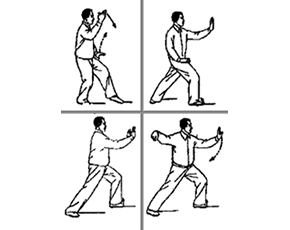 Reducing anxiety and depression
Reducing anxiety and depression- Improving balance, flexibility and muscle strength
- Reducing falls in older adults
- Improving sleep quality
- Lowering blood pressure
- Improving cardiovascular fitness in older adult
- Relieving chronic pain
- Increasing energy, endurance and agility
- Improving overall feelings of well-being
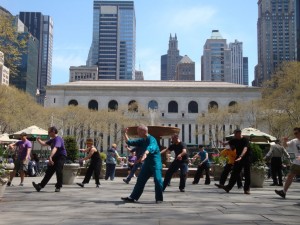 Clearly these benefits go beyond improving brain function and cognitive performance. Getting started in Tai Chi is not hard. There are many fine resources available for little cost. You can produce results in as little as 8-12 weeks.
Clearly these benefits go beyond improving brain function and cognitive performance. Getting started in Tai Chi is not hard. There are many fine resources available for little cost. You can produce results in as little as 8-12 weeks.
Check out this 5 minute free video for a decent introduction. It won’t make you an expert but it should be enough to determine if you want to try more. There is a product pitch but it is soft.
I am interested in readers’ suggestions for resources for learning Tai Chi, especially those that emphasize improving brain function and cognitive performance.
Categories: Ancient Ways, Manage Emotions, Memory and Learning, Mental Focus, Perception, Training Tags: cognitive fitness, embodied cognition, exercise
Yawn to Cool Down, Focus and Power-Up Mentally
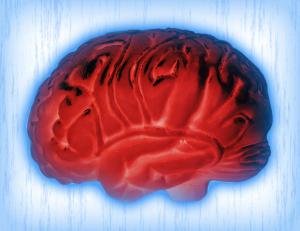 The role of yawing in cognitive performance is being rethought.
The role of yawing in cognitive performance is being rethought.
We yawn to cool our brains and crank up our mental alertness. Keeping the brain cool, like keeping a computer cool, is critical for efficient operation. In short, yawing will boost your cognitive performance not dull it.
The process works by moving blood into the brain.
For an excellent (and short) explanation of the new science of yawing and how to put it to use check out The 3-Second Energy Boost. I especially like the suggestions for how to bring on a yawn including thinking about one (they are contagious) and faking one.
The key for readers of the Next Brain Blog is that yawing is an important means of naturally maintaining mental efficiency. Don’t want to stifle that.
Categories: Lifestyle, Mental Focus Tags:
Silence at the Right Time Improves Cognition
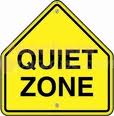 A Psychology Today blog has an excellent post on the effective use of silence. It is a good reminder that just being quiet often gives the brain a chance to work well. Being silent can improve your listening skills, self control and even your attractiveness to others. The key is to know when to get into the quiet zone – for example, when you are angry or when someone else is speaking.
A Psychology Today blog has an excellent post on the effective use of silence. It is a good reminder that just being quiet often gives the brain a chance to work well. Being silent can improve your listening skills, self control and even your attractiveness to others. The key is to know when to get into the quiet zone – for example, when you are angry or when someone else is speaking.
When it comes to exercising the power of silence to achieve self-control the author writes:
“Think how much more in control you’d not only appear but actually be if your first response upon hearing or seeing something that sparks a strong reaction in you wasn’t to lash out emotionally but instead to become–silent. Silence is a terrific substitute for self-control, not only creating its appearance, but over time and with practice its substance as well.”
Although similar to the “count to 10 rule” for managing anger it is a bit different. The idea is to focus on being silent or learning to get into the quiet zone.
Interested to hear from readers that practice the power of silence and how it has helped them be more effective.
Categories: Ancient Ways, Executive Function, Lifestyle, Manage Emotions Tags:

